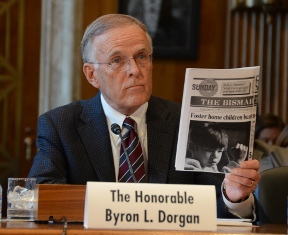U.S. SENATE –Chairman Jon Tester (D-MT) held a U.S. Senate Committee on Indian Affairs hearing to address bipartisan legislation that protects families and children and improves access to critical resources in Indian Country.
“These bills are designed to improve tribes’ ability to determine their own futures and protect the well-being of their people,” said Tester (D-MT), who is prioritizing children’s issues and self-governance during his tenure as chairman. “Keeping Native children safe is key to ensuring that their future – and the future of our Native communities – remains bright.”
 Witnesses testified on the following five bills:
Witnesses testified on the following five bills:
• The Alyce Spotted Bear and Walter Soboleff Commission on Native Children Act (S. 1622)
Speaking in support of S. 1622, retired Senator Byron Dorgan (D-ND) said, “During my time in the Senate, I served as Chairman of the Senate Committee on Indian Affairs where I worked on issues that directly impacted Indian children. I knew that Indian children were, and still are, the most at-risk population in America. These young people experience the highest rate of suicide of any population and I remain committed to work on this issue and improve lives of our youngest First Americans.” Dorgan added, “The Commission, proposed by this legislation, will conduct a much-needed, multidisciplinary study of the diverse challenges experienced by Native children and then develop concrete, actionable recommendations for improving the current system of programs and services. Identifying a baseline and developing concrete next steps to address these challenges are important steps in improving the lives of Native children.”
• Native American Child Safety Act (S. 2160)
“In 2011 and 2012, the Spirit Lake Tribe lost three very young children to homicides. These homicides devastated our community and exposed system-wide flaws and inconsistencies,” said Leander Russell McDonald, Tribal Chairman of the Spirit Lake Tribe of North Dakota. “The proposed legislation would expand background check requirements for all adults residing in prospective foster care homes when Native American children are to be placed by tribes or the Bureau of Indian Affairs. This legislation would bridge an existing gap that has been identified within our community and provide a necessary step to ensuring that all adults residing with children in a foster care setting are properly screened.”
• Alaska Safe Families and Villages Act of 2013 (S. 1474)
“Generations of Alaska Natives living in rural Alaska have been ignored by the state’s public safety and justice systems, a fact which has created despair among tribal members. The interconnected scourges across rural Alaska of domestic violence, sexual assault and rape, child abuse and neglect, and alcohol and drug abuse are undeniable, both from the experts’ statistics and from eyewitnesses like me, and the time for positive congressional reform is long overdue,” said Natasha Singh, a tribal court judge in Stevens Village, Alaska. “What is needed is federal legislation which recognizes the authority of our tribal governments to deal in the first instance with issues of local domestic violence, sexual assault, and drug and alcohol abuse. That is what is needed, and that is what Congress, alone, can accomplish.”
• Indian Employment, Training and Related Services Consolidation Act (S. 1574)
Margaret Zientek, co-chair of the 477 Tribal Work Group testified on the importance of the Indian Employment, Training and Related Services Consolidation Act Public Law 102-477 allows Federally-recognized Tribes and Alaska Natives to combine Federal grants funds, for employment and training initiatives into a single plan with a single budget and a single reporting system.
“This bill takes the crucial steps to make the very successful demonstration project permanent, provides more detailed processes that build on the experience of the past decades of implementation, and opens up the opportunity to add other programs,” Zientek said.
• Indian Health Service Advance Appropriations Act (S. 1570)
“As this Committee well knows, IHS and the Veterans Administration are unique within the federal government because these two agencies provide direct medical services. For this reason, maximizing the effectiveness and integrity of the IHS system demands steady and predictable funding,” said Natasha Singh. “Sharp and unpredictable funding swings cause severe disruptions and hardships, not just for IHS and tribal providers, but for the patients who depend on the IHS system as their only source of health care. The IHS system must not be forced into lock-down or suspension every time the annual appropriations cycle limps along to final enactment.”
Tester intends to mark up the bills and send them to the full Senate in the next few weeks. The Committee’s next hearing will be on education in Indian Country.
###
